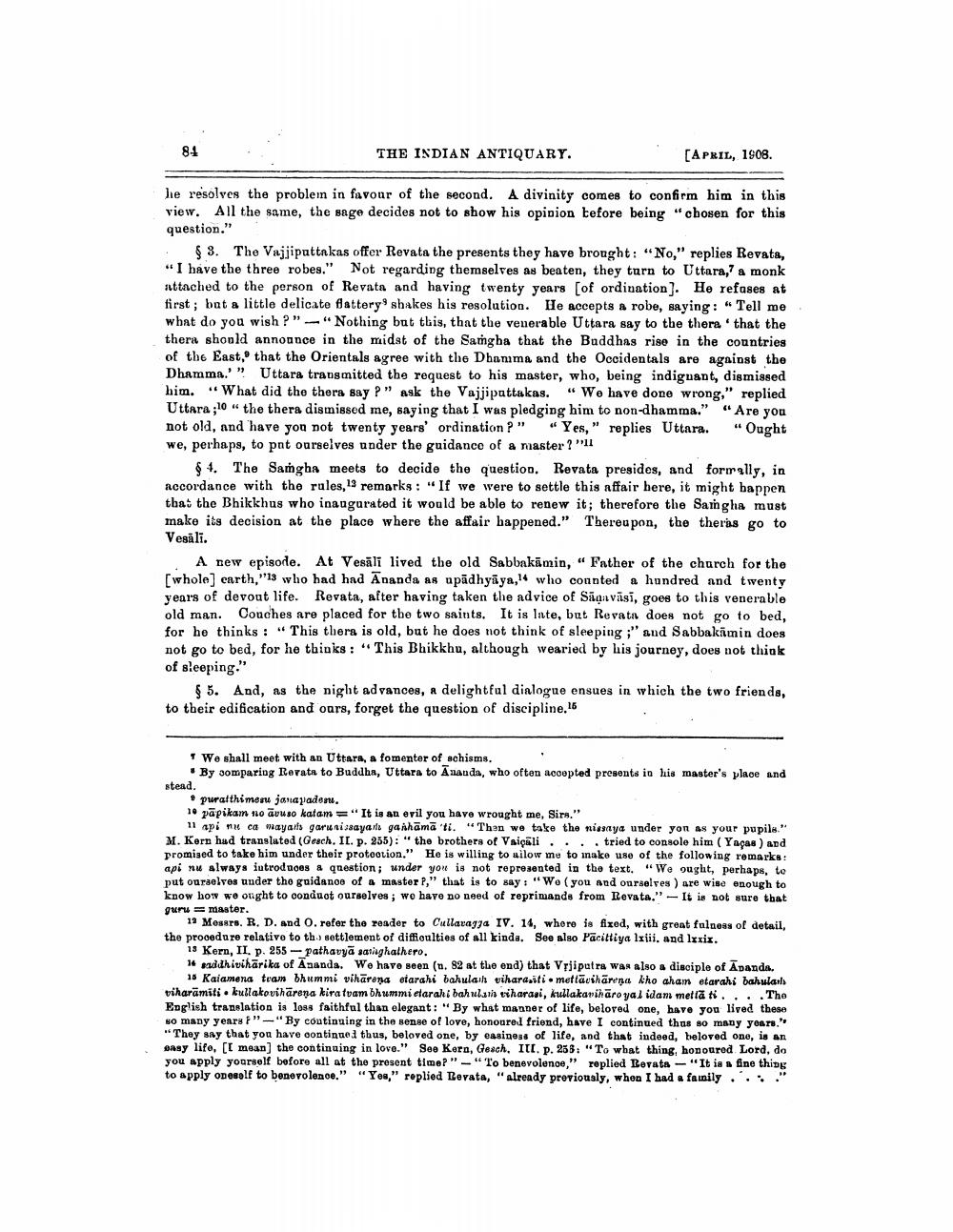________________
94
THE INDIAN ANTIQUARY.
[APRIL, 1908.
le resolves the problem in favour of the second. A divinity comes to confirm him in this view. All the same, the page decides not to show his opinion before being chosen for this question."
3. The Vajjipattakas offer Revata the presents they have brought: "No," replies Revata, "I have the three robes." Not regarding themselves as beaten, they turn to Uttara, a monk attached to the person of Revata and having twenty years (of ordination). He refases at first; bat a little delicate fattery shakes his resolution. We accepts a robe, saying: "Tell me what do you wish ?" "Nothing but this, that the venerable Uttara say to the thera' that the thera should announce in the midst of the Samgha that the Buddhas rise in the countries of the East, that the Orientals agree with the Dhamma and the Occidentals are against the Dhamma.'” Uttara transmitted the request to his master, who, being indiguant, dismissed him. "What did the thera say?" ask the Vajjipattakas. “We have done wrong," replied Uttara ;10 " the thera dismissed me, saying that I was pledging him to non-dhamma." "Are you not old, and have you not twenty years' ordination ?" "Yes," replies Uttara. "Ought we, perhaps, to pnt ourselves under the guidance of a master?"
84. The Samgba meets to decide the question. Revata presides, and formally, in accordance with the rules, 12 remarks: "If we were to settle this affair here, it might bappen tha: the Bhikkhus who inaugurated it would be able to renew it; therefore the Samgha must make its decision at the place where the affair happened." Thereupon, the theras go to Vesili.
A new episode. At Vesäli lived the old Sabbakimin, "Father of the church for the [whole) carth,"13 who had had Ananda as apādhyāya, who counted a hundred and twenty years of devout life. Revata, after having taken the advice of Saanvāsi, goes to this venerable old man. Couches are placed for the two saints. It is Inte, but Revata does not go to bed, for he thinks : "This thera is old, but he does not think of sleeping ;" and Sabbakimin does not go to bed, for he thinks : "This Bhikkhu, although wearied by his journey, does not think of sleeping."
$5. And, as the night advances, a delightful dialogue ensues in which the two friends, to their edification and oars, forget the question of discipline.16
"We shall meet with an Uttara, a fomenter of schisms.
. By somparing Rovata to Buddha, Uttara to Ananda, who often coopted prosents in his master's place and stead.
puratthimeru janapadene. 10 pāpikam no āvu so katam="It is an evil you have wrought me, Sirs."
11 api mu ca mayais garu nisaya lo ga Ahāmā 'ti. “Then we take the nisaya under yon as your pupila." M. Kern had translated (Gesch. II. p. 255); "the brothers of Vsicali .... tried to console him (Yaças ) and promised to take him under their proteotion." He is willing to ailow me to inake use of the following remarks: api mu always introduces & question; under you is not represented in the text. "We ought, perhaps, to put ourselves under the gaidance of a master ?," that is to say: "Wo (you and ourselves ) are wise enough to know how we ought to conduot ourselves we have no need of reprimands from Revata." It is not sure that guru = master.
19 Mossro, R. D. and 0. refer the reader to Cullaragja IV. 14, whore is fixed, with great fulness of detail, the procedure relative to th) settlement of difficulties of all kinda. Soo also Pacittiya lxjii. and lxxix.
13 Kern, II. p. 255-pathavyä sainghalhero. # addhiviharika of Azanda. We have seen (n. 82 at the end) that Vriipatra was also a disciple of Apanda.
tarahi bahulah vihardasti. Mettausharena lho aham etarahs bahulails viharāmiti. kullakovihārena kira tvam bhummi etarahi bahulata iarasi, kullakavihāroyal idam met tā ti... The English translation is loss faithful than elegant: "By what manner of life, beloved one, have you lived these so many years"-"By continuing in the sense of love, honoured friend, have I continued thus so many years." "They say that you have continue thus, beloved one, by easiness of life, and that indeed, beloved one, is an easy lifo, [[ mean] the continuing in love." See Kern, Gesch. III. p. 253: "To what thing, honoured Lord, do you apply yourself before all at the prosent time?" "To benevolence," replied Berats "It is a fine thi to apply oneself to benevolence." "You," replied Revata, "already proviously, when I had a family .. ."




